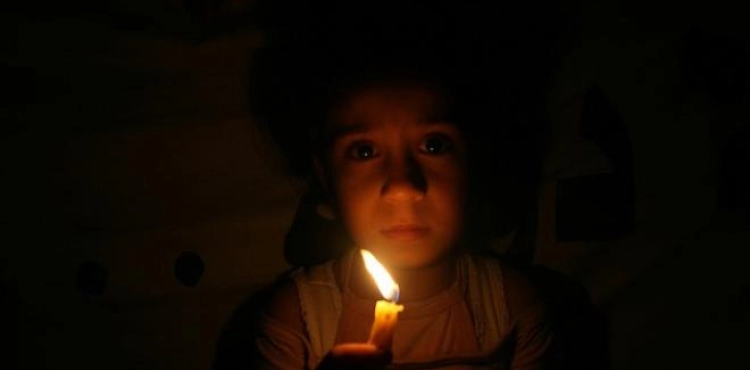A new study by the International Committee of the Red Cross shows that around 80% of Gazans spend most of their lives in complete darkness, with electricity only available for 10 or 12 hours a day at best. This problem becomes more and more threatening to the health and well-being of the population, especially in light of the continuing rise in temperatures. The overwhelming majority of study participants confirmed that they cannot even keep food in the refrigerator, and the situation causes sewage systems to fail.
The study confirmed that the chronic shortage and continuous power cuts in Gaza take a heavy psychological toll on the residents of Gaza, as 94% of those surveyed reported that their mental health had been affected by this situation. The most recent escalation in hostilities during May destroyed infrastructure and caused a significant shortage of supplies through the main electricity networks and thus residents only had access to electricity for 4 or 5 hours per day.
"There are at least 500,000 people in Gaza who cannot afford additional supplies of electricity through generators and are forced to spend most of their day without electricity," she said.
“We have a small battery to power the LED lights, and we only recharge it when we have electricity,” says Abu Ahmed Darwish, a 64-year-old father who lives in Al-Bureij camp. “The battery only lasts for an hour or two, then we stay in the dark most of the time. ".
The most important conclusions of the study:
94% of those surveyed said that their mental health had deteriorated due to their lack of continuous access to electricity.
82% of study participants said they were unable to keep food in the refrigerator due to the situation.
27% of those surveyed said that they were unable to secure any alternative to the electricity supplied by the municipality. Of those, 91% cannot afford to buy more electricity.
57% said they have access to alternative means of providing electricity but not enough to meet their needs in life and work.
In the survey, Gaza residents indicated that the lack of electricity for many years made daily life very difficult, making it almost impossible to complete household chores, not to mention the failure of appliances when the power was cut off, the lack of running water, and the students’ inability to finish their homework. People are under a huge financial burden to purchase additional generators, in addition to the severe health risks of living in a polluted environment as a result of power cuts.
Maryam Hunedek, a mother of six who lives in the Nahr al-Bared camp in the southern Gaza Strip, says: “When the power goes out, I feel like I´m in a cemetery. It´s pitch black. I light the oil lamp to illuminate the house, and even the LEDs are not enough because the batteries are not fully charged. Also, I don´t always have oil for the lamp and it is often not enough for my children to do their homework."
The Red Cross said that the results of the study came to confirm what the residents of Gaza had told us, and to support the validity of the ICRC´s observations in this regard. With electricity only available for three to four hours a day during peak times during the crisis, Gazans found themselves facing severe restrictions preventing them from leading their lives normally. Knowing that even during periods of calm, electricity supplies reach Gaza for 10-12 hours a day, and the extreme heat and restrictions on importing fuel to operate the Gaza power plant poses a threat to the health and daily life of Gaza residents.
"The lack of electricity also means that sewage is being pumped into the sea without treatment, polluting large parts of Gaza´s beach. This not only pollutes the sea, but also contributes to the rapid spread of antibiotic-resistant bacteria, which endangers people´s health," the organization added. in Gaza and beyond.
"The electricity crisis in Gaza has worsened," said Miriam Mueller, head of the ICRC sub-delegation in Gaza. "It is severely affecting basic services such as water supply, sewage treatment and sanitation, as well as affecting businesses and the ability to irrigate agricultural crops." People and public health conditions in Gaza and other urban contexts depend heavily on electricity, even after the fighting ends. In 2021, the people of Gaza should not live like this. We call on the relevant authorities and the international community to recognize the situation in Gaza and work to improve it." .
Program to Strengthen the Resilience of Vital Services in Gaza
Electricity is not the only service that is not available in Gaza, but it is the basis on which other services depend, such as the supply of potable water, sewage treatment, health services, and irrigation of local agricultural crops. All systems are interconnected, and when one of them fails, life is disrupted in other related aspects as well.
The ICRC launched the Resilience of Critical Services in Gaza project in 2020, which aims to understand how critical systems and networks in Gaza are interconnected, and to seek ways to enhance their “resilience” in the event of future hostilities, including improving water networks Sanitation and electricity supply in a flexible manner.
One example of this is the use of automation systems to run operations related to critical infrastructure such as power transformers and pumping stations so that no one has to risk their lives to operate them manually in times of conflict. The program to enhance the resilience of vital services in Gaza also enables more efficient and flexible management of the interconnected water and electricity networks in Gaza.












